September 2017 Newsletter
Welcome to the September 2017 issue of the Global Washington newsletter.
IN THIS ISSUE
- Letter from our Executive Director
- Issue Brief: Innovations in Cash-Based Aid Help Promote Financial Inclusion for the Poor
- Organization Profile: The Bill & Melinda Gates Foundation – Financial Services for the Poor
- Changemaker: Thea Anderson, Technical Lead for Financial Services in Crisis, Mercy Corps
- GlobalWA Member Events
- Career Center
- GlobalWA Events
Letter from our Executive Director
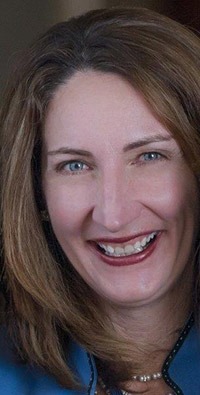
The Pacific Northwest is known for its natural beauty, technical innovation, and a collaborative, can-do spirit. That’s why I’m not surprised that so many advancements in humanitarian aid and development are coming from right here in our region.
Disruptive innovation in the financial sector is happening all over the world, but nowhere is this more true than in developing countries. As humanitarian organizations experiment with ways to deliver financial aid to families in emergencies, digital forms of cash have opened up new avenues to make a transformative impact.
An estimated two billion people currently don’t have bank accounts, and yet 80 percent of adults in emerging economies have a mobile phone. Rather than sit back and wait for commercial banks to reach more people, disruptive development change makers are working to make sure poor people have access to affordable financial tools to better manage their savings, protect against losses, and invest in their future.
In this month’s issue we dig deep on this topic. The technical lead for financial services in crisis at Mercy Corps gives us her thoughts on what it takes to succeed in this field and where she thinks it’s all heading. Then we take a closer look at how the Bill & Melinda Gates Foundation is working together with humanitarian organizations, governments and business partners to clear the way for this transformation in financial solutions for the poor.
As we head into the fall and winter months, I hope you will learn more about the global work of non-profits, for-profits, academic institutions and foundations based in the northwest region, and the global leadership needed for the future. Find out more at Renewing.Global and join the conversation at our annual conference on November 29. Hope to see you there.

Kristen Dailey
Executive Director
Issue Brief
Innovations in Cash-Based Aid Help Promote Financial Inclusion for the Poor
By Andie Long
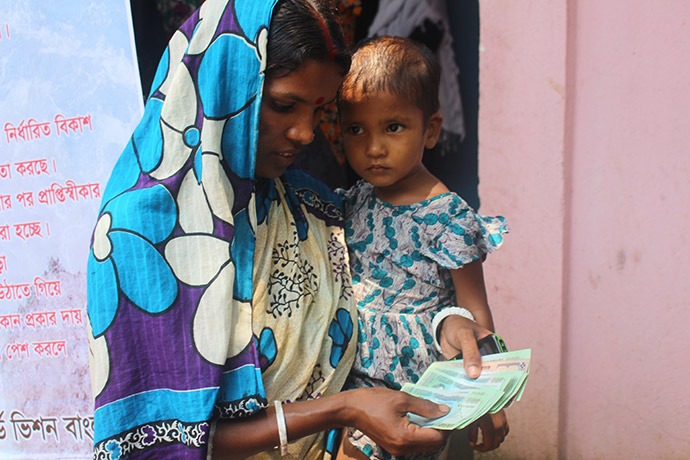
Flooding in Bangladesh in early 2017 impacted nearly 5 million people. Affected families received cash from World Vision to purchase food and rebuild their lives. Photo: World Vision
Humanitarians have begun to acknowledge a painful reality: There are more people in critical need globally than we can reach. That is, if we stick to business as usual in emergency response.
According to the UN Refugee Agency, “An unprecedented 65.6 million people around the world have been forced from home.” Layer on slow onset disasters like the hunger crises that have been building in Yemen and Eastern Africa, and add in sporadic natural disasters – earthquakes, tsunamis, hurricanes, floods, landslides – and you have a global response community stretched almost to the breaking point.
Giving cash directly to people in emergencies is one solution to the growing gap between humanitarian needs and capacity. In fact, research over the last decade has proven this method of aid delivery to be not only cheaper than traditional in-kind aid, but also incredibly effective at alleviating suffering.
A paper jointly authored by the Overseas Development Institute and the Center for Global Development two years ago extolls the benefit of cash-based humanitarian aid where appropriate. In addition to reducing the cost of providing aid, giving cash instead of stuff increases the speed of the response, improves transparency, and enables recipients to purchase exactly what they need when they need it most. And it has the added benefit of supporting local economies and businesses.
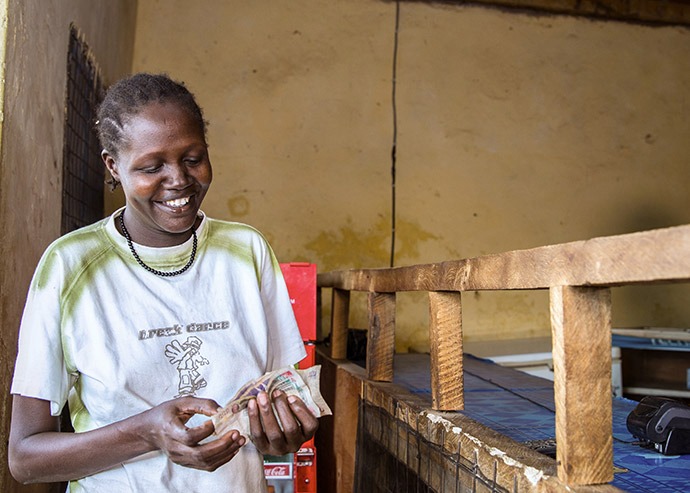
Catherine Nabulon, 34, of Abulon, Kenya, uses her E-wallet to procure safe drinking water for her family. Photo: Joy Obuya/Oxfam
To be sure, giving cash is no panacea. Where markets aren’t functioning, and where broader systemic needs are lacking, traditional aid responses are still necessary.
Only about 6 percent of all humanitarian aid is cash-based today, but that figure is growing. Further, cash aid is increasingly going digital, and this presents an opportunity to solve yet another challenge associated with poverty: financial exclusion.
According to McKinsey & Company, two billion people in emerging economies lack access to formal savings and credit. Having access to formal financial services would enable the poor to better manage their financial lives.
While they may not have access to financial services, nearly 80 percent of adults in emerging economies have something else – a mobile phone. Foundations like The Bill and Melinda Gates Foundation and aid organizations like Mercy Corps are increasingly exploring ways to turn cash-based aid into an on-ramp to wider financial inclusion for the poor.
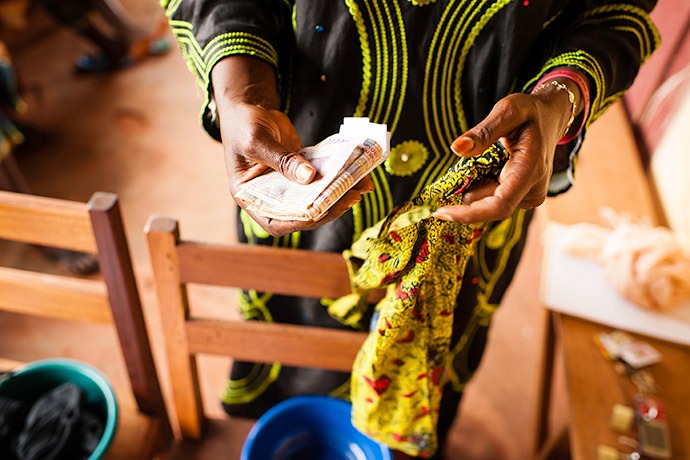
A Mercy Corps partner in Bangassou, Central African Republic, explains to beneficiaries how a community bank works. Photo: Sean Sheridan for Mercy Corps.
The following Global Washington members are currently providing cash-based emergency aid globally, whether in the form of physical cash and vouchers, or as mobile money and electronic vouchers:
Bill & Melinda Gates Foundation
The Bill & Melinda Gates Foundation’s Financial Services for the Poor program aims to play a catalytic role in broadening the reach of robust, open, and low-cost digital payment systems, particularly in poor and rural areas—and expanding the range of services available on these platforms. Their approach includes three objectives: Increasing poor people’s capacity to weather financial shocks and capture income-generating opportunities; generating economy-wide efficiencies by digitally connecting large numbers of poor and low-income people to one another and to financial services providers, government services, and businesses; and reducing the amount of time and money that poor people must spend to conduct financial transactions.
Over the last decade, Mercy Corps has implemented cash programming in 31 countries including Syria, Ukraine, Haiti, Niger, Yemen and Uganda. Mercy Corps was the first organization to pilot cash-for-work in Afghanistan and in response to the Indian Ocean Tsunami in 2004. Since July 2016, the organization has distributed over $46 million dollars in cash programming — benefiting more than 173,000 households. In 2017, Mercy Corps connected more than 1 million people to cash during emergencies, infusing more than $46 million into local economies around the world.
When disaster strikes, people living in the affected communities often lose the assets and income they need to keep their families fed, sheltered, and clothed. Distributions of cash can help disaster-affected families meet the complex needs that arise. For Oxfam, it’s a means to empower people and give them some control over their own destiny at a time of great uncertainty. Both in Oxfam’s humanitarian response programs, and in its advocacy to change government policy, cash programming is one of the central ways of supporting food security and livelihoods in an emergency context. Oxfam will continue to promote a “cash first” approach, so long as it is backed up by sufficient analysis of the market, wider context, and utilizes a well-honed information communication technologies capacity – and where it is not appropriate, Oxfam will utilize other modalities, including in-kind support.
During the 2011-2012 Horn of Africa famine, World Concern provided families with vouchers for food and other items, but they have since found cash to be more efficient and useful for beneficiaries during a disaster or crisis. The organization is distributing cash grants of approximately $80 to families in Somalia affected by the current drought crisis. Families are using the cash to purchase food and supplies to survive. In addition, in 2016 World Concern provided cash to families in Haiti affected by Hurricane Matthew.
Cash-based programming is an increasingly important tool for tackling the underlying causes of poverty. World Vision recognizes that using cash strengthens local markets; restores dignity and choice to people who are in need; and can provide efficient, tailored help to families. In 2016, the World Vision International CEO committed to providing 50% of the organization’s humanitarian assistance through cash by 2020.
Organization Profile
The Bill & Melinda Gates Foundation – Financial Services for the Poor
By Andie Long
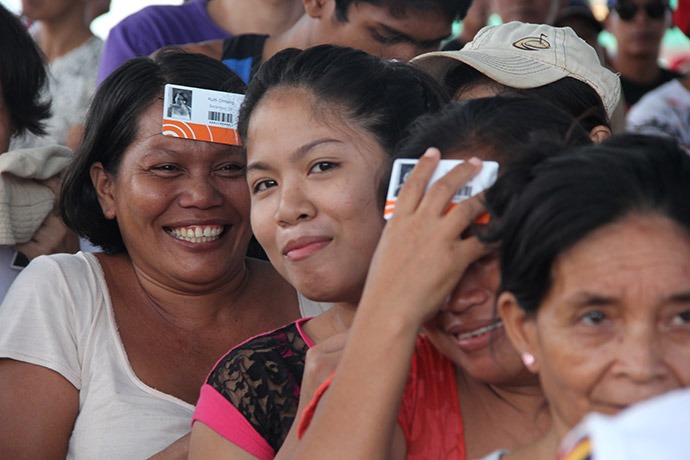
Giggling community members have a bit of fun in line, as they wait to use their Last Mile Mobile Solutions cards to pick up their goods. They are part of a cash-for-work program implemented by World Vision following Typhoon Haiyan in The Philippines. Photo Credit: World Vision
The Bill & Melinda Gates Foundation’s mission is to enable all people to lead healthy, productive lives. One of the most powerful leverage points the foundation has found to increase opportunities for people in the developing world to lift themselves out of poverty is ensuring they have access to the right tools to manage their financial lives.
“Poor people like everyone else have complex financial lives,” said David Lubinski, a senior program officer at the foundation. With the right financial tools, people can securely put away small amounts of money over time to create a cushion for unexpected financial shocks and to invest in growing their income through money-making opportunities.
Increasingly, as the humanitarian community has shifted towards cash, including digital money, as the preferred method for providing aid in emergencies, the foundation, other donors and their partners have been exploring how to turn these digital payments into a gateway to greater financial inclusion for those who have been marginalized or excluded from the financial system.
In early 2016, representatives from more than two dozen organizations, including the humanitarian and financial sectors, as well as funders and other experts, gathered in Barcelona to discuss how to make that dream a reality. Out of the two-day meeting, participants derived eight guiding principles for digital payments in humanitarian response.
With the Barcelona Principles in hand, the foundation’s Financial Services for the Poor and Emergency Response teams reached out to Ericsson, a telecom service provider, to explore possible commercial technology solutions that humanitarian organizations could learn from and possibly use to help deliver on this mission.
Ericsson was already a part of the United Nations’ emergency telecommunications cluster, and well-versed in disaster response. The company also had its own mobile wallet product, and the foundation sought to learn from the humanitarian community what else was missing.
As it turned out, quite a lot.
“When we first started working with Ericsson, what we thought was that the humanitarian organizations just needed a better technology,” Lubinski said. Instead, the four biggest challenges they found had very little to do with technology.
What was most urgently needed by the humanitarian community was a standard and efficient way to legally identify people. Within the financial sector, there’s something called KYC, which stands for “Know Your Customer,” and it enables financial institutions to comply with regulations and laws, not the least of which are anti-money laundering and countering financing of terrorism. Yet, Lubinski and the broader team working on this found that there were many diverse definitions of what could constitute the “minimum viable KYC.”
But KYC isn’t just a big problem for the humanitarian agencies; it’s also a challenge for the entire financial services ecosystem. At this point, Lubinski and his team posed two questions: Why is KYC different in emergency response than in non-emergency? And should it be?
To get to the bottom of these questions, the foundation became a major funder of Identification for Development. Hosted by The World Bank, ID4D is a group that is looking at how to arrive at a minimum standard data set for the approximately 1.1 billion people in the world who are currently unable to prove their identity, and are therefore excluded from not only financial services, but also healthcare, social safety nets, education, political participation, and more.
A second major challenge for humanitarian organizations wanting to use commercially available mobile wallets in emergency settings is that, in Lubinski’s words, “Sometimes donors ask for silly things – and they cost a lot!”
For example, a donor might stipulate that her funds only go to a particular individual, and only be used for one specific thing – such as food. This type of request might seem reasonable to the donor, because she wants accountability. But should the recipient of those funds be required to juggle multiple digital wallets in order to keep money from different sources separated? And what if there is money left over in one digital wallet, say the food budget, while another category, like medical expenses, is suddenly more urgent? Allowing for the beneficiary to make these decisions on her own is empowering and it reduces the administrative burden of tracking each and every purchase for every account holder.
The last two major barriers to using mobile wallets in emergency settings come down to infrastructure – physical infrastructure and human infrastructure. GSMA, the global mobile network providers association, along with others are looking at ways to improve damaged or insufficient infrastructure after a crisis or natural disaster. Further, The Level One Project at the foundation is taking a broad look at in-country policies and requirements that prevent resilient digital financial ecosystems from taking hold.
Finding ways to improve and expand financial services for the poor is just one of many complex challenges that The Bill & Melinda Gates Foundation has taken on to alleviate extreme poverty.
“We have co-chairs of the foundation who challenge us to take risks, including taking on these challenges in partnership with the community of humanitarian organizations who respond with frontline services in every disaster,” Lubinski said. “We are not funded by any government so we do not and cannot have a political agenda. That means we have an important role to play in accepting bigger risks and tackling the most pressing challenges facing the people who are most vulnerable – and this includes the two billion people who today do not have access to the basic tools to manage their financial lives.”
Changemaker
Thea Anderson, Technical Lead for Financial Services in Crisis, Mercy Corps
By Andie Long
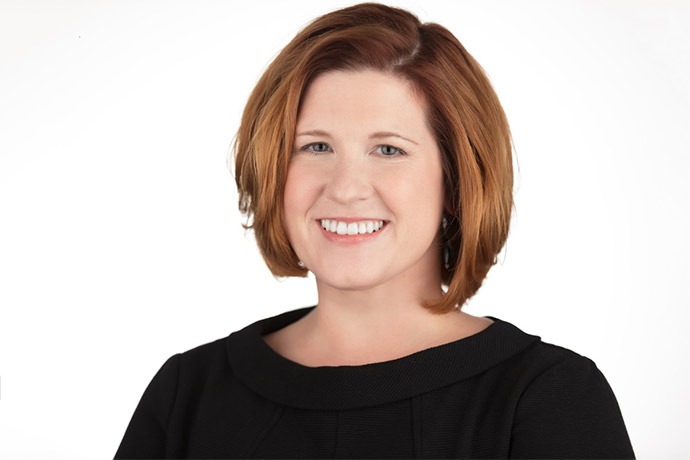
Not everyone is comfortable talking about financial services in a humanitarian setting, which may belie our own discomfort with the topic of money. For Thea Anderson, Mercy Corps’ technical lead for financial services in crisis and migration, money itself is an enabler, the thing that holds together any type of successful humanitarian and development response.
“I see financial services as the critical piece for reaching larger development, resilience, and humanitarian goals,” said Anderson.
Over the last 16 years, Anderson has worked in over 40 countries, managing multimillion-dollar financial and market system programs in fragile and complex environments across Africa, the Middle East, and Central Asia. Her first exposure to financial services came in 1998, when she began her career at CHF International – now Global Communities.
“They had a huge focus on financial services when I started,” she said. “CHF looked at ways to provide housing finance to people post-disaster, as well as financing to reinforce structures, so they could better withstand future disasters. After a disaster, people can fall into such deep cycles of debt. You need different savings and insurance products to help mitigate that.”
Asked what she likes best about the financial services sector, Anderson said, “I love how dynamic it is. It’s constantly changing with new actors, new technologies, and new research so we can understand what works and what doesn’t.”
Increasingly, Anderson finds herself excited by the role technology can play in increasing access to financial services. Yet she says, “The challenge is making sure it is used to include, rather than exclude people.”
The youngest of three kids growing up in Kentucky, Anderson remembers her family moving around a lot. But it wasn’t until college that she was exposed to life outside the U.S. “It was then that I realized there’s a whole world out there that I wanted to be a part of!”
To succeed in this field, Anderson advises would-be financial services practitioners to cultivate a wide range of technical skills and experiences.
“You need to be open to new technologies and working with people and understanding what their actual needs are and what their lives look like. You also have to be flexible and always wanting to learn, travel, and meet new people. If you stay closed off, the innovation will pass you by.”
When she thinks about how financial services will change within the humanitarian context over the next ten years, Anderson has a few theories. “I see the role of technology growing, especially the use of mobile technology and the potential role of digital ledger technology. Peer to peer financial options are also going to be stronger and more digital based.”
Anderson also sees a huge role for remittances sent from family members working abroad. In Africa alone, over $40 billion is sent and received annually in remittances from diaspora populations.
“Not only do remittances put money directly into people’s pockets, supporting household expenses such as food, education fees, and health costs, but they also enable longer-term investments in housing or businesses,” she said. “There is a huge opportunity to move remittances onto digital channels, reduce transaction costs, and ensure that ‘last mile’ clients can easily send and receive payments.”
Even the United Nations has recognized the need to elevate the focus on remittances. The Sustainable Development Goals push governments and providers to find ways to reduce remittance transaction costs and improve the infrastructure.
Having worked on market development and financial services at Mercy Corps for the last six years, Anderson recently took on a new role: financial services in fragile regions and frontier markets where the agency works. This includes a focus on refugee and internally displaced populations and opportunities to integrate people into local and national economies.
“Fragility is very context specific and within a country there can be separate fragile regions,” said Anderson. This might include countries or regions affected by a rapid-onset disasters (such as natural disasters or conflicts), as well as latent fragility, such as drought-prone areas, and long-simmering conflicts that cross borders. “Households and business owners often face reoccurring shocks and stresses, making it difficult for them to get ahead.”
People’s financial needs are often the same in both fragile and non-fragile areas. However, the challenge is that fragile regions tend to have higher overall operating costs, owing to the unpredictable political environments, poor infrastructure, and greater movements of people.
Mercy Corps has set an ambitious agenda for itself, not only to use digital cash relief in emergency settings to help families and business owners get back on their feet, but also where appropriate, to increase opportunities for them to access formal banking services. Mercy Corps’ relief effort in The Philippines after Typhoon Haiyan in 2013 is one such example, and it led to the organization being awarded the Global Mobile Award by GSMA in 2015 for “Best Use of Mobile in Emergency or Humanitarian Situations.”
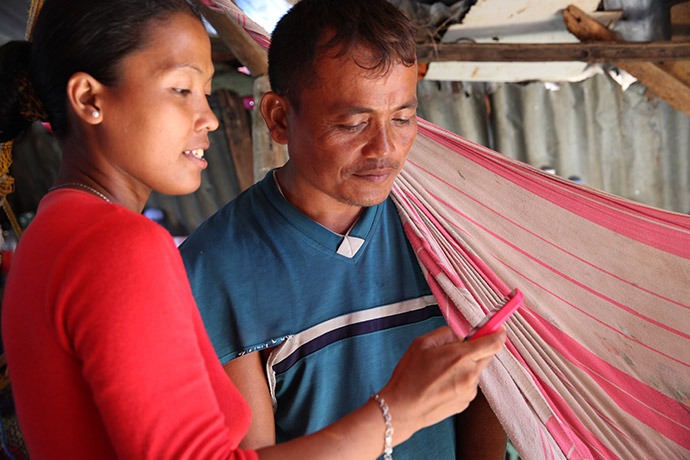
Merly and her husband Niño Francisco check their mobile bank account in North Cebu, Philippines. The couple were part of an unconditional cash mobile transfer program by Mercy Corps, following Super Typhoon Haiyan in 2013. Photo: Cassandra Nelson/Mercy Corps.
To coordinate these complex responses, Anderson and her team work with people from many different sectors – businesses, donors, foundations, governments and regulatory agencies, even religious institutions.
Cultivating trust among so many different groups can be challenging. “It requires understanding the different incentives behind each of the actors’ interest in financial inclusion,” said Anderson.
But the challenge is worth it.
“As an NGO we can’t do it alone. When we partner with the private sector, we have the potential to reach millions of underserved and underbanked individuals and get them on a pathway to financial inclusion.”
Organizations like Mercy Corps are looking for ways to reduce the potential risk for financial service providers in order for them to consider new clients, such as people in rural communities, or displaced populations, and offer new financial products to meet their needs.
“When companies look at their next billion customers, they will find organizations like Mercy Corps are already there,” said Anderson. “This creates a unique opportunity to build lasting partnerships that strengthen communities and meet commercial needs at the same time.”
Member Events
Sep 30: Women’s Enterprises International // Harambee Gala
Sep 30: SIGN Fracture Care International // Wine Dine for SIGN
Oct 7 – 15: Ashesi University Foundation // 9th Annual Trip to Ghana
Oct 11: Washington Nonprofits // Effective Online Donation Strategies
Oct 13: International Rescue Committee // Rebuilding Lives Dinner
Oct 26: Sahar: Education for Afghan Girls // Dinner
Oct 28: Mission Africa // 2017 Benefit Luncheon
Oct 28 – Nov 4: Partners Asia // Ultimate Bike Trip to Myanmar
Career Center
Chief Development Officer, Landesa
Executive Director, Seattle International Foundation
Marketing Associate, Upaya
For more jobs and resources, visit https://globalwa.org/job-board/
GlobalWA Events
October 26: Inland Northwest Conference for the Greater Good
November 2: Financing Sustainable Agriculture
November 29: GlobalWA Annual Conference – Renewing Global Leadership